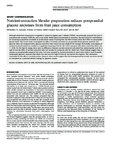Nutrient-extraction blender preparation reduces postprandial glucose responses from fruit juice consumption
| dc.contributor.author | Redfern, Kathy | |
| dc.contributor.author | Cammack, VM | |
| dc.contributor.author | Sweet, N | |
| dc.contributor.author | Preston, | |
| dc.contributor.author | SoBHCS Student Team, | |
| dc.contributor.author | Jarvis, Michael A | |
| dc.contributor.author | Rees, Gail | |
| dc.date.accessioned | 2017-10-25T09:17:58Z | |
| dc.date.available | 2017-10-25T09:17:58Z | |
| dc.date.issued | 2017-10-09 | |
| dc.identifier.issn | 2044-4052 | |
| dc.identifier.issn | 2044-4052 | |
| dc.identifier.other | ARTN e288 | |
| dc.identifier.uri | http://hdl.handle.net/10026.1/10089 | |
| dc.description.abstract |
<jats:title>Abstract</jats:title><jats:p>Although whole-fruit consumption is regarded as protective against type 2 diabetes (T2DM), conventionally prepared fruit juice is associated with increased T2DM risk, and current public health advice recommends its restriction. ‘Nutrient extractor’ style blenders are increasing in popularity worldwide as an alternative means of juicing fruit, but little is known about their effect on postprandial glucose levels. The current study investigated the effect of nutrient extraction on postprandial blood glucose response and glycemic index (GI) compared with a glucose control for both mixed fruit and a high GI fruit (mango). Remarkably, consumption of nutrient-extracted mixed fruit resulted in a significant lowering of the GI (32.7±8.5) compared with whole mixed fruit (66.2±8.2, <jats:italic>P</jats:italic><0.05). For the high GI mango, there were no differences between nutrient-extracted and whole fruit, indicating that even for a high GI fruit the effect of nutrient extraction does not increase GI compared with the whole fruit. These findings suggest that, in contrast to conventionally prepared fruit juice, fruit juice prepared by nutrient extraction in some cases elicits a more favorable postprandial glycemic response than whole fruit and even for high GI fruits do not worsen the response. The mechanism responsible for this effect is currently unclear. However, these results suggest that fruit homogenized by nutrient extraction should be considered as a potential dietetic strategy for glycemic control.</jats:p> | |
| dc.format.extent | e288-e288 | |
| dc.format.medium | Electronic | |
| dc.language | en | |
| dc.language.iso | en | |
| dc.publisher | Nature Publishing Group | |
| dc.subject | Adult | |
| dc.subject | Blood Glucose | |
| dc.subject | Cross-Over Studies | |
| dc.subject | Diabetes Mellitus, Type 2 | |
| dc.subject | Female | |
| dc.subject | Food Handling | |
| dc.subject | Fruit | |
| dc.subject | Fruit and Vegetable Juices | |
| dc.subject | Glycemic Index | |
| dc.subject | Humans | |
| dc.subject | Kinetics | |
| dc.subject | Male | |
| dc.subject | Mangifera | |
| dc.subject | Postprandial Period | |
| dc.subject | Risk Factors | |
| dc.title | Nutrient-extraction blender preparation reduces postprandial glucose responses from fruit juice consumption | |
| dc.type | journal-article | |
| dc.type | Journal Article | |
| plymouth.author-url | https://www.webofscience.com/api/gateway?GWVersion=2&SrcApp=PARTNER_APP&SrcAuth=LinksAMR&KeyUT=WOS:000412546200001&DestLinkType=FullRecord&DestApp=ALL_WOS&UsrCustomerID=11bb513d99f797142bcfeffcc58ea008 | |
| plymouth.issue | 10 | |
| plymouth.volume | 7 | |
| plymouth.publisher-url | https://www.nature.com/nutd/journal/v7/n10/full/nutd201736a.html | |
| plymouth.publication-status | Published online | |
| plymouth.journal | Nutrition and Diabetes | |
| dc.identifier.doi | 10.1038/nutd.2017.36 | |
| plymouth.organisational-group | /Plymouth | |
| plymouth.organisational-group | /Plymouth/Faculty of Health | |
| plymouth.organisational-group | /Plymouth/Faculty of Health/School of Biomedical Sciences | |
| plymouth.organisational-group | /Plymouth/REF 2021 Researchers by UoA | |
| plymouth.organisational-group | /Plymouth/REF 2021 Researchers by UoA/UoA01 Clinical Medicine | |
| plymouth.organisational-group | /Plymouth/Research Groups | |
| plymouth.organisational-group | /Plymouth/Research Groups/Institute of Health and Community | |
| plymouth.organisational-group | /Plymouth/Research Groups/Institute of Translational and Stratified Medicine (ITSMED) | |
| plymouth.organisational-group | /Plymouth/Research Groups/Institute of Translational and Stratified Medicine (ITSMED)/CBR | |
| plymouth.organisational-group | /Plymouth/Research Groups/Plymouth Institute of Health and Care Research (PIHR) | |
| plymouth.organisational-group | /Plymouth/Users by role | |
| plymouth.organisational-group | /Plymouth/Users by role/Academics | |
| dc.publisher.place | England | |
| dcterms.dateAccepted | 2017-08-19 | |
| dc.identifier.eissn | 2044-4052 | |
| dc.rights.embargoperiod | Not known | |
| rioxxterms.versionofrecord | 10.1038/nutd.2017.36 | |
| rioxxterms.licenseref.uri | http://www.rioxx.net/licenses/all-rights-reserved | |
| rioxxterms.licenseref.startdate | 2017-10-09 | |
| rioxxterms.type | Journal Article/Review |


